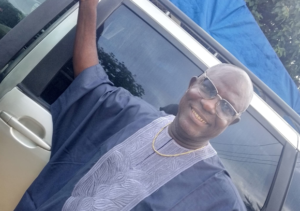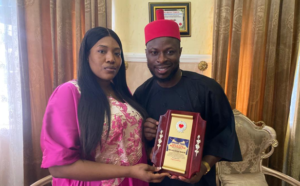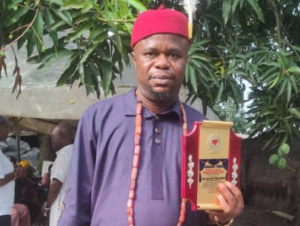Face of Resilience. By Ugo Johnson Anyiam.
8 min read
Note: Below is the inaugural speech presented by Chief Ugo Johnson Anyiam, a barrister at law and the President of the Igbo Lawyers Association South Africa ILASA, during the official inauguration of the association held on 26 October 2024 in South Africa.

His Excellency Ambassador Alexander Temitope Ajayi, thanks for gracing us with your presence. His Excellency Dr Alex Otti, Esteemed Guests, Ladies and Gentlemen, All Protocols Duly Observed. Ndi ichie, Nze na Ozo, all distinguished Igbo leaders, I extend my most respectful greetings to you, ekele m unu.
It is with great humility, joy, and a profound sense of duty that I stand before you on this monumental occasion, marking the official inauguration of the Igbo Lawyers Association. Today, we gather not merely as legal professionals, but as a people bound by a shared heritage and common cultural values. This moment, without a doubt, reflects the strength, resilience, and enduring unity of Nigerians and South Africans, and I am honoured to be part of this historic chapter.
One might ask: why establish an Igbo Lawyers Association and not a broader Nigerian Lawyers Association? The answer lies in the very nature of federalism as enshrined in the Constitution of the Federal Republic of Nigeria. The name “Igbo Lawyers” derives from the Igbo region in southeastern part of Nigeria, this choice transcends ethnic delineations and aligns with the federalist principles that inform the governmental structure of the Federal Republic of Nigeria.
Our forefathers negotiated a federal system that envisioned a Nigeria where the strength of one region would complement that of another, creating a dynamic synergy across the federation. We must all refuse to conflate this with tribalism as may be preferred by the politicians.
The Igbo Lawyers Association was initially established in response to the teething career challenges faced by our founders. However, we have since evolved, positioning ourselves not merely as a professional organization but as a proponent of a truly federated system. By advocating for federalism, we are modeling a structure in which regional professional bodies (such as ours) are empowered to contribute significantly to the project of nation-building.
Although the topic at hand is not directly linked to federalism, but as a legal scholar, particularly having engaged with the writings of political theorists like Johannes Althusius, Montesquieu, John Locke, Jean-Jacques Rousseau, and Thomas Hobbes, we recognize how such influences can easily capture the magination.

For now, however, we turn our attention to the topic of tonight’s gathering:
FACE OF RESILIENCE. In the Nigerian context, resilience is not just a personal attribute but a societal product, deeply intertwined with the federal character of the nation. Our ability to endure, adapt, and thrive under challenging conditions is not only a testament to our strength as a people but a direct outcome of our constitutional structure, which, when properly realized, fosters the conditions for regional development and national cohesion.
Tonight, I am privileged to present to you living embodiments of this concept—three individuals whose stories of resilience echo far beyond their personal triumphs. Their journeys reflect the Nigerian spirit of perseverance and underscore the very essence of our legal community’s foundation (These three individuals are with us here tonight).
Case Study 1: Attorney Odira Steve Mwim (who is with us here tonight) Steve’s journey is a striking illustration of personal resilience. Initially arriving in South Africa from Nigeria in 1997 as a postgraduate student to study law at Pearson institute (then Eduvos), Steve held the expectation that he could balance academic pursuits with part-time employment. Unfortunately, during his first year of studies, he was unable to secure employment, leading to severe financial distress and ultimately forcing him to put on hold his LLB program temporarily.
Faced with these challenges, Steve adopted an unconventional survival strategy. Rather than succumbing to despair, he began working as a shoe cleaner in front of Sunny Park Mall Pretoria. This shift in occupation represents not merely an economic adaptation but also a profound psychological resilience. The financial
hardships he endured served as motivation to re-enter the academic space, this time at UNISA, where he pursued his Master’s Degree in Philosophy while working as a course advisor. His determination did not end there. Recognizing the bleak employment prospects in his field of study and having performed excellently well in the field of philosophy, Steve was given the opportunity to diversify his skill-set by enrolling yet again to study law while simultaneously pursuing a masters in philosophy.
Today, Attorney Steve has not only completed his legal education but has also established a successful law practice (over the past two decades) with offices in Pretoria, KZN, and Limpopo. Employing over 35 legal professionals and support staff, his achievements stand as a testament to the interplay of resilience, strategic planning, and an unwavering commitment to overcoming socioeconomic challenges. Steve’s experience, from shoe cleaner to an accomplished legal practitioner, exemplifies the dynamic process of resilience wherein adversity is not merely survived but utilized as a foundation for personal and professional growth.
Case Study 2: Adaku and Obi-Adaku is also here with us tonight (real names withheld).
The second narrative centres on Adaku and her husband Obi, who relocated to South Africa in 2010. Their decision to leave Nigeria was not motivated by economic hardship, but rather by a desire to provide what they believed was a better future for their children. Prior to their migration, Obi had a thriving IT business in Lagos, and Adaku held a senior management position at a Nigerian Bank. Upon arriving in South Africa, they aimed to establish a real estate business, supported by significant financial resources.
However, their aspirations were abruptly disrupted by a traumatic robbery in which they lost their cars, valuable assets, and funds earmarked for their business venture. The psychological impact of this incident was severe, inducing a prolonged period of emotional paralysis and business stagnation.

Adaku’s resilience, however, emerged in the wake of this crisis. Rather than capitulating to the trauma, she resolved to rebuild her life by returning to academia. She enrolled in law school, where she spent six years completing her LLB degree, undergoing the rigorous process of legal training and articles of clerkship.
Today, Ada has successfully transitioned from a place of despair to the legal profession, having established her own law firm. Her story is a powerful representation of entrepreneurial resilience, illustrating how individuals can recover from significant personal and financial loss to rebuild their professional identities. It also underscores the role of education as a transformative mechanism that enables individuals to pivot and reinvent themselves in response to adverse circumstances.
Case Study 3: Attorney Chidilim Chukwuma (also present with us here tonight).
Finally, the third face of resilience is embodied by Attorney Chidilim Chukwuma. She arrived in South Africa as one of the best graduating students of the department of Foreign Languages and Translation studies. She rejected very lucrative job offers in Nigeria to join her husband, a medical doctor, in South Africa.
Finding herself at ground zero, Attorney Chukwuma faced significant hurdles, including the difficulty of securing employment in any field at all. Refusing to stay idle, she went back to school, while caring for her young family.
She took a course in business management, and together with her husband, started several businesses here in South Africa, including baking and selling chin-chin, donuts and cakes, importing and selling Nigerian wax. Today she and her husband own the only company with license to import our beloved Peak milk from Holland.
She achieved all this while completing her law degree. While serving her articles of clerkship, she proceeded to write and pass the very difficult notary and conveyancing exams.
Attorney Chukwuma’s dedication to both her legal studies and business was so successful that today, she is a dedicated businesswoman, a mother and a dedicated attorney, notary and a conveyancer. (Women and multitasking! )
Her journey showcases not only legal perseverance but also the innovative spirit that so often accompanies resilience.
The narratives of Steve, Adaku, and Mrs Chukwuma exemplify the resilience of our community and the broader African experience. These stories reflect not just personal triumphs but the enduring strength of Nigerians who face adversity head-on and rise above it. Each of these individuals (like the rest of ILASA members) began their journey in South Africa initially not as lawyers, yet through resilience and perseverance, they are now pillars of the legal profession, and employers of labour.
At the heart of our association’s founding is the collective challenge many of us faced in gaining legal qualifications and securing articles of clerkship. As mature students, predominantly of African descent, we encountered structural barriers to entering the legal profession. It is precisely these shared challenges that brought us together and inspired the creation of ILASA. It is our mission is to provide mentorship, guidance, and support to future generations of African law graduates, ensuring they are not deterred by the hurdles we faced.
In conclusion, ILASA stands not only as a professional body but as a beacon of resilience—committed to mentoring, nation-building, and contributing to the legal landscape of South Africa.
The success stories arising from the resilience of Nigerians and other foreign nationals in South Africa should not be obscured by any social ill be it xenophobia or otherwise, that Africans are making significant strides in Africa should be celebrated.
The significant role played by South African women in this success stories should and must be celebrated.
The resilience and strength demonstrated by South African women have deep roots in the nation’s struggle during the apartheid era. During these dark years of apartheid, whether as single women, mothers, or grandmothers, South African women provided stability and continuity when men were often absent due to imprisonment, labour migration to the mines, or exile. Their vital contributions during this period helped maintain both the physical and moral integrity of the home, which in turn reinforced the broader fight for national liberation.
Even in contemporary South Africa, where many women have achieved remarkable success in academia, the professions, and industry, they have not lost their innate ability to provide care and nurturing – qualities that are indispensable in times of adversity. These attributes have been generously extended to Nigerian migrants, as well as other Africans underscoring the South African woman’s enduring commitment to pan-African solidarity.
The narrative surrounding Nigeria’s support for the African National Congress (ANC) during the apartheid struggle is well-known, well documented and often highlighted in media discussions. However, it is important to clarify that this historical relationship is not the primary reason Nigerians migrate to South Africa.(We all know why we come here ) though individual circumstances may vary.
I could share my own personal journey of how I came to make South Africa my home, but such a story would require an occasion of its own—perhaps another gala dinner in the future, as the details are both rich, complex and very exciting.
In light of the profound impact South African women have had, it would be insufficient merely to offer them a round of applause. Instead, I propose we celebrate them in a more fitting manner by dancing in recognition and appreciation of their invaluable contributions.
Thank you all
Attorney Ugo Johnson Anyiam
26 October 2024




